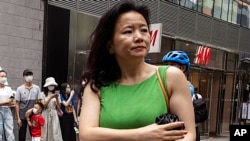Australia has called on China to grant an Australian television anchor detained by authorities in Beijing contact with her family. Cheng Lei was working for the Chinese government's English language broadcaster CGTN when she was taken into custody in August 2020. She was formally charged on suspicion of "illegally supplying state secrets overseas" and has had no contact with her family since her arrest.
Cheng Lei’s detention is one of a number of pressure points on Australia’s relationship with China.
The journalist was born in China but moved with her parents to Brisbane, Queensland, when she was 9 years old. The Australian citizen is accused by Beijing of leaking state secrets.
Australia has insisted it expects “basic standards of justice” and for Cheng to be treated humanely.
For two years, though, the television anchor has had no contact with her two children in the Australian city of Melbourne.
Prime Minister Anthony Albanese said he believes that is unfair.
“This is something that should happen,” he said. “There has been no transparency in any of these processes at all. The Chinese government needs to do better.”
China’s ambassador to Australia, Xiao Qian, gave a rare television interview, telling the Australian Broadcasting Corp. that Cheng’s case was being handled in accordance with Chinese law.
“Cheng Lei's case is very special in the sense that she's been charged of transmitting national security information overseas,” he said. “The trial is going on, the trial is going on, because it is relating to something like the national security, so it's conducted in a way it's not open to the public. It doesn't mean there is no evidence. There is evidence.”
Xiao said while he could not interfere with the legal proceedings, he was trying to arrange “much easier access” for Cheng's relatives on a "humanitarian" basis.
In a wide-ranging interview, he also warned that Taiwanese people who support full independence from the mainland would be "punished" according to Chinese law.
The ambassador also said there was “nothing true” in a recent United Nations report that accused China of serious violations of human rights, including torture, of its minority Uyghur population in Xinjiang province.
Australian Foreign Minister Penny Wong said the allegations in the report were “harrowing."
Various trade and political disputes have derailed Australia’s relations with China in recent years. Canberra’s call in 2020 for an independent investigation into the origins of COVID-19 caused deep resentment in Beijing, where it was seen as criticism of its handling of the virus.
It was first detected in China, but the government in Beijing said Australia’s demand for a global inquiry could damage bilateral ties “beyond repair.”
Tensions remain, but both sides have said they were eager to restore harmony and trust to the relationship.
China is Australia’s most important trading partner, but Canberra’s decades-old military alliance with the United States has been a constant source of friction with Beijing.




